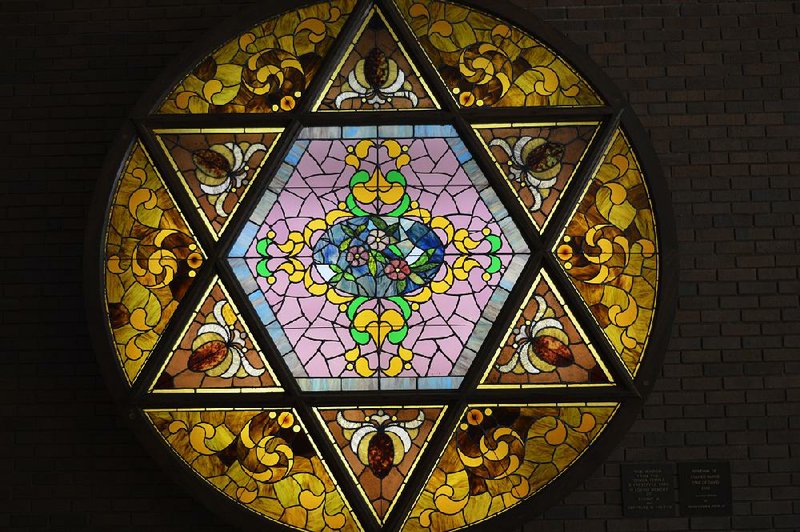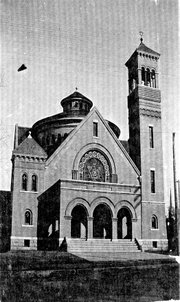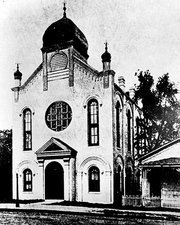Rabbi Rick Jacobs, president of the Union for Reform Judaism, will be the featured speaker Friday night as members of Congregation B'nai Israel celebrate their 150th anniversary.
The congregation was a founding member of the Union for Reform Judaism, formerly known as the Union of American Hebrew Congregations, which was formed in 1873. Reform Judaism is the largest branch of Judaism in the United States, and as president Jacobs represents the more than 900 congregations and roughly 1.5 million members who are part of the union. He will speak during a Shabbat service at 8 p.m. at Temple B'nai Israel, 3700 N. Rodney Parham Road.
The congregation will continue its celebration with a gala and dinner May 14, and students in the religious school will have anniversary activities the following day.
The congregation's spiritual leader, Rabbi Barry Block, said he's looking forward to welcoming Jacobs to the temple.
"He's the 12th president, but to the best of our records he's the fourth to visit our congregation," Block said.
Rabbi Isaac Mayer Wise, founder of the Union of American Hebrew Congregations, came to Little Rock to dedicate the second temple in 1897. Rabbi Maurice Eisendrath came for the centennial celebration in 1966, and Rabbi Alex Schindler was present for the 1975 dedication of the current temple.
"It's been more than 40 years since a president for the Union for Reform Judaism was here in Little Rock so that's historic, as well," Block said. "I'm looking forward to him sharing his vision for Reform Judaism with our congregation."
Block said the anniversary is a time to reflect on the congregation's long history and its founding.
The history of Congregation B'nai Israel began in 1866 when Jewish residents in Little Rock gathered money to buy a Torah scroll so they could celebrate the High Holy Days that year. This was after the end of the Civil War and Jewish families and merchants were settling in Little Rock in increasing numbers.
"The congregation was founded at a really searing time for the people who founded it," Block said. "In 1866 in Arkansas most of the founders were Confederate veterans -- a bedraggled and defeated group ... yet they got themselves together and moved forward and established a congregation, and here we are with this magnificent edifice with a strong, engaged congregation. There's so much to celebrate not only about our history but also about our future and present."
Originally known as the Little Rock Congregation, the group formally incorporated in 1867 as Congregation B'nai Israel.
Longtime member Leah Elenzweig compiled historical information for an anniversary book, Our Sesquicentennial History, which each congregant will receive as a gift during the weekend celebrations. She said the congregation grew as Little Rock grew and because the city's location along the Arkansas River made it easy for merchants to access goods and set up shop.
As the Jewish population began to grow, residents realized they needed a place for Jewish burials so Morris Navra, who would become the congregation's first president, organized a burial society to buy lots at Mount Holly Cemetery.
"There was a lot of yellow fever and people were dying, so that was a priority," Elenzweig said.
In 1874 the congregation bought land for their own cemetery, Oakland Jewish Cemetery at 2101 Barber St., and many of those interred at Mount Holly were moved there. Oakland is on the National Register of Historic Places. Congregation member Jim Pfeifer, who also serves as archivist at the temple, organizes historical re-enactments at the cemetery to tell the stories of those buried there.
In the early days of the congregation's history, members rented building space on Markham Street as a place for worship. While there members began raising money to buy land of their own. The first temple, completed in 1872, was on Center Street and as the congregation grew members established a Sabbath School for students. As membership continued to increase, the congregation outgrew the Center Street location and decided to move and build a larger structure. The second temple, which was home to the congregation for more than 70 years, was at the corner of Capitol Avenue and Broadway. The temple was dedicated May 9, 1897.
The congregation moved to west Little Rock in 1975, when the current temple was completed. It was designed to include features and items from the longtime home downtown. For example, a large, circular stained glass window from the old building featuring the Star of David hangs in the fellowship hall.
The building also features a humidity-controlled archive room and museum. Boxes and boxes of material contain the history of the congregation and its founders. The collection includes a timeworn record book that contains entries from the first meeting in 1866, the details put down in meticulous handwriting.
Pfeifer said the archives also include the occasional oddity, including a letter from J. Edgar Hoover. In the letters and writings of longtime spiritual leader Rabbi Eugene Levy, Pfeifer said those sifting through the records discovered correspondence from former civilian Navy intelligence analyst Jonathan Pollard, who was imprisoned for spying on the United States for Israel (he was released last year). Pollard was writing to Levy because of the rabbi's friendship with Bill Clinton, who was president at the time the letters were written. Pollard apparently hoped to get the attention of the president.
Elenzweig and Pfeifer said it's important to honor the congregation's past not just during the anniversary celebration.
"We want people to understand the true gift we've been given that we are enjoying today," Elenzweig said. "We are so fortunate to have an amazing congregation of people who learn together, worship together and do good deeds together -- these are three pillars of Judaism. To continue to do that for the next 150 years is extremely important so they [the next generation] can have the same gifts."
Although Jewish congregations across the South continue to dwindle and close, Block said Congregation B'nai Israel is committed to the future.
"We're here for the long haul," he said.
Information about the congregation is available online at bnai-israel.us.
Religion on 05/07/2016




